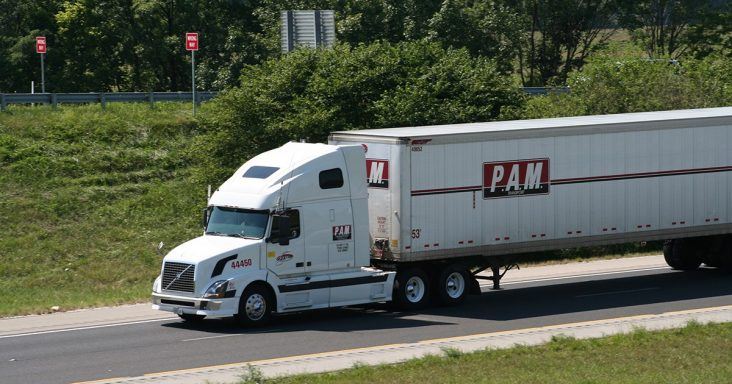P.A.M. posts fourth-quarter loss; driver wage lawsuit affects earnings
by February 25, 2020 10:46 am 1,120 views

Tontitown-based carrier P.A.M. Transportation Services Inc. earnings were negatively impacted by a proposed lawsuit settlement involving failure to pay minimum wage to drivers and driver misclassification as the company reported a net loss in the fourth quarter. The lawsuits impacted earnings by nearly $20 million.
P.A.M. reported Monday (Feb. 24) a net loss of $13.64 million, or a loss of $2.37 per share, in the fourth quarter, compared to net income of $6.07 million, or $1.01 per share, in the same period in 2018, according to a filing with the U.S. Securities and Exchange Commission. The company’s fourth-quarter and 2019 financial results were included in the disclosure for the proposed lawsuit settlement. Fourth-quarter revenue fell 10.6% to $123.5 million, from $138.17 million in the same period in 2018. Fuel surcharges fell 21.9% to $16.8 million in the fourth quarter of 2019 and contributed to the revenue decline as a result of lower average fuel prices.
For 2019, net income fell 67.1% to $7.9 million, or $1.34 per share, from $23.99 million, or $3.90 per share. Revenue fell 3.6% to $514.18 million, from $533.26 million. Lower average fuel prices also impacted revenue for 2019, with fuel surcharges falling 14.6% to $87.4 million for the year.
In the carrier’s logistics division, revenue fell to $18.39 million, from $22.54 million. For 2019, revenue decreased to $75.92 million, from $89.29 million. Operating ratio, or expenses as a percentage of revenue, rose to 96.7% in the fourth quarter, from 93.9% in the same period in 2018. For 2019, it increased to 94.7%, from 94.4%.
Excluding the lawsuit impacts, earnings in the fourth quarter of 2019 were $1.6 million, or 28 cents per share, and for 2019, earnings were $23.4 million, or $3.99 per share. Fourth-quarter and 2019 net income were negatively impacted as a result of the money reserved for the expected settlement of a lawsuit regarding the violation of minimum wage laws and for a similar suit with regard to drivers being misclassified as owner-operators, according to the filing.
The U.S. District Court for the Western District of Arkansas granted preliminary approval Feb. 24 of a settlement of the company’s previously disclosed collective and class-action lawsuit in which the complainants, who include former and existing employee drivers claiming the company violated federal and state minimum wage laws, including “failure to pay minimum wage during orientation, failure to pay minimum wage to team drivers after initial orientation, failure to pay minimum wage to solo-drivers after initial orientation, failure to pay for compensable travel time, Comdata card fees, unlawful deductions and breach of contract,” according to the filing. The drivers in the suit worked for the company from Dec. 9, 2013, through Dec. 31, 2019. The federal court has yet to give final approval to the proposed settlement, and the filing shows the company does not admit fault or liability in the case.
“In my entire career I don’t know that I have experienced a year in which we were presented with so many challenges,” President Daniel Cushman said. “Not necessarily broad industry challenges, but challenges specific to PAM Transport. In the third quarter, our Mexico border-crossings, which affect almost 50% of our freight, were shut down for two days due to a hurricane. Then we experienced extreme border-crossing inefficiencies at Laredo when border agents were pulled from Laredo to help with immigration issues at other border towns, which resulted in delays and cancellations of cross-border shipments for up to two weeks. Then there was the United Auto Workers labor strike against General Motors, our largest customer, which lasted almost six weeks. This impacted two weeks in September and the entire month of October. All these challenges were presented against a backdrop of consistent downward rate pressure, similar to what was experienced in 2016 and 2017. And finally, we recognized litigation expense of $19.9 million primarily related to a preliminary settlement agreement in a class-action suit brought against us regarding allegations of minimum wage violations.”
However, the company ended 2019 with its second-best year of operating income, excluding equipment sales gains and litigation expenses, Cushman said. During the strike in October, the carrier had 400 drivers who depended on General Motors freight, and nearly all of the drivers wanted to continue to work. The carrier found new freight opportunities for the drivers. The company lost 12 of the 400 drivers, and its overall fleet size increased by six drivers as it maintained profitability throughout the strike, Cushman said. Operating income was positive in October and for the fourth quarter, excluding the litigation costs.
“We have seen several major motor carriers exit the Mexico market within the past 18 months,” Cushman said. “It’s been well documented how many carriers exited the marketplace during 2019, and some of those carriers are major players in the automotive sector. I understand why carriers would struggle servicing Mexico, and the automotive sectors as their freight is some of the most difficult and demanding freight to service well. It’s also where PAM Transport excels. As a result, we faced the strongest headwinds in recent memory and still maintained profitability on an adjusted basis.”
P.A.M. looks to buy the Mexican business of bankrupt Celadon Group, including carrier Jaguar Transportation, for $7 million, according to a recent FreightWaves article. The proposal follows a January deal to purchase Celadon’s terminal in Laredo, Texas, for nearly $20 million.
In the filing, Cushman noted the carrier’s logistics division outperformed industry averages in revenue and profit. While revenue and profit fell from 2018, both declined less than most other logistics companies. The division has increased its customer base as it pivots between contract and spot market business, he said.
Shares of P.A.M. (NASDAQ: PTSI) were trading midmorning Tuesday (Feb. 25) at $46.65, down $1.65 or 3.42%. In the past 52 weeks, the stock has ranged between $71.56 and $41.82.
